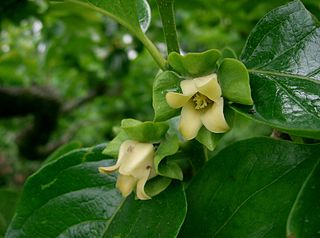
Diospyros is a genus of over 700 species of deciduous and evergreen trees and shrubs. The majority are native to the tropics, with only a few species extending into temperate regions. Individual species valued for their hard, heavy, dark timber, are commonly known as ebony trees, while others are valued for their fruit and known as persimmon trees. Some are useful as ornamentals and many are of local ecological importance. Species of this genus are generally dioecious, with separate male and female plants.
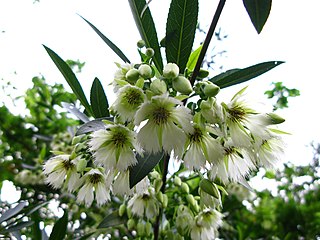
Elaeocarpus is a genus of nearly five hundred species of flowering plants in the family Elaeocarpaceae native to the Western Indian Ocean, Tropical and Subtropical Asia and the Pacific. Plants in the genus Elaeocarpus are trees or shrubs with simple leaves, flowers with four or five usually petals and usually blue fruit.

Terminalia is a genus of large trees of the flowering plant family Combretaceae, comprising nearly 300 species distributed in tropical regions of the world. The genus name derives from the Latin word terminus, referring to the fact that the leaves appear at the very tips of the shoots.

Cissus is a genus of approximately 350 species of lianas in the grape family (Vitaceae). They have a cosmopolitan distribution, though the majority are to be found in the tropics.
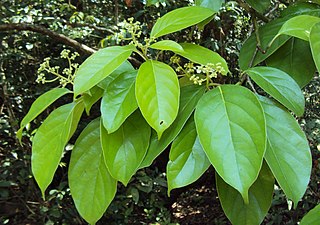
Mastixia is a genus of about 19 species of resinous evergreen trees, usually placed in the family Cornaceae. Its range extends from India through Southeast Asia and New Guinea to the Solomon Islands. Mastixia species have alternate or opposite simple broad leaves, many-flowered inflorescences, and blue to purple drupaceous fruits.

Vatica is a genus of plants in the family Dipterocarpaceae.

Wendlandia is a genus of flowering plants in the family Rubiaceae. It is found in northeastern tropical Africa, and from tropical and subtropical Asia to Queensland.

Amyema is a genus of semi-parasitic shrubs (mistletoes) which occur in Malesia and Australia.

Salacia is a genus of plants in the family Celastraceae. They are woody climbers naturally found in tropical regions.

Lumnitzera is an Indo-West Pacific mangrove genus in the family Combretaceae. An English common name is black mangrove. Lumnitzera, named after the German botanist, Stephan Lumnitzer (1750-1806), occurs in mangroves from East Africa to the Western Pacific, and northern Australia.
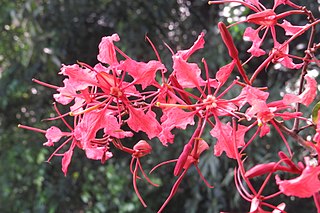
Phanera is a genus of flowering plants in the legume family, Fabaceae. It belongs to the subfamily Cercidoideae. This genus differs from Bauhinia in being vines or lianas, generally with tendrils and a lobed rather than spathaceous calyx, and from Schnella in having only three fertile stamens rather than ten, and being native to the Indomalayan realm and the Australasian realm rather than the Americas. The subsection Corymbosae was recently segregated into a new genus, Cheniella. It has been suggested that the genus Lasiobema should be reduced to a section within Phanera.
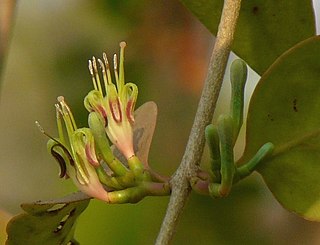
Macrosolen is a genus of plants in the family Loranthaceae. It includes about 83 species all over the world with ca. 40 species widely distributed in tropical South and Southeast Asia. Some species were described by de Loureiro, Lecomte, Danser (1938) and Hô (2003).

Sonerila is a genus of plants in the family Melastomataceae. This genus is characterized by presence of three petals as opposed to five in the other members of the family. Most members of the genus prefer growing in shady habitats. It is a large genus including about 175 species.
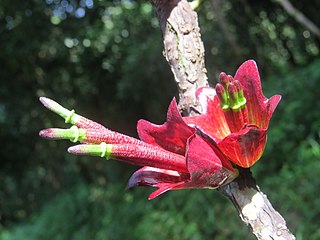
Tolypanthus is a genus of plants in the family Loranthaceae.
Lepeostegeres is a genus of flowering plants belonging to the family Loranthaceae.


















